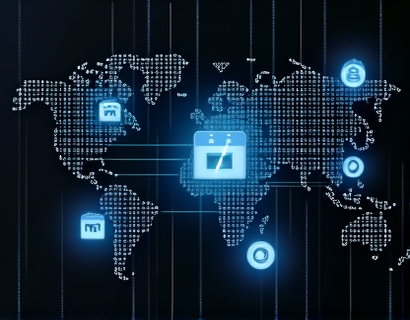Autonomous AI Agents: Streamlining Continuous Objectives for Business and Personal Productivity Boost
In the rapidly evolving landscape of business and personal productivity, the integration of Autonomous AI Agents stands out as a transformative force. These intelligent systems are designed to manage and optimize continuous objectives, allowing both businesses and individuals to concentrate on their core activities. By automating routine and repetitive tasks, Autonomous AI Agents not only streamline operations but also significantly enhance efficiency and productivity. This article delves into the multifaceted benefits of these AI-driven solutions, offering practical strategies to maximize productivity in a world where time is a precious resource.
The concept of Autonomous AI Agents revolves around the idea of creating intelligent, self-managing systems that can operate with minimal human intervention. These agents are programmed to understand and prioritize tasks based on predefined criteria, adapt to changing conditions, and continuously learn from their environment. The primary goal is to reduce the manual effort required to achieve and maintain continuous objectives, thereby freeing up valuable time and mental energy for more strategic and creative endeavors.
Enhancing Business Operations
For businesses, the implementation of Autonomous AI Agents can lead to substantial improvements in operational efficiency. One of the most significant advantages is the automation of routine administrative tasks such as data entry, scheduling, and report generation. These tasks, while necessary, are time-consuming and often prone to human error. By delegating these responsibilities to AI agents, businesses can reduce the workload on their staff, minimize errors, and accelerate the completion of tasks.
Moreover, Autonomous AI Agents excel in managing complex project workflows. They can monitor multiple tasks and projects simultaneously, ensuring that deadlines are met and resources are allocated optimally. This level of oversight and control helps in identifying potential bottlenecks early on, allowing for proactive problem-solving and smoother project execution. The ability to dynamically adjust priorities based on real-time data further enhances the agility and responsiveness of business operations.
Boosting Personal Productivity
On an individual level, Autonomous AI Agents can revolutionize personal productivity by taking over mundane tasks and providing personalized support. For instance, AI agents can manage calendars, set reminders, and even suggest optimal times for tasks based on the user's schedule and habits. This not only helps in maintaining a well-organized life but also reduces the cognitive load associated with remembering and planning daily activities.
Additionally, these agents can assist in time management by analyzing how time is spent and offering insights to optimize routines. They can identify time-wasting activities and suggest more efficient alternatives, helping individuals to focus on high-value tasks. The personalized nature of AI agents means that they can adapt to individual preferences and work styles, providing tailored support that enhances overall productivity.
Optimizing Workflows
One of the key strengths of Autonomous AI Agents is their ability to optimize workflows continuously. By analyzing data from various sources, these agents can identify inefficiencies and suggest improvements. For example, in a manufacturing setting, an AI agent can monitor machine performance, predict maintenance needs, and adjust production schedules to minimize downtime. This predictive maintenance approach not only reduces costs but also ensures consistent output quality.
In office environments, AI agents can optimize the flow of information and communication. They can automate the routing of emails, prioritize messages based on urgency, and even facilitate collaborative tasks by coordinating between team members. This streamlined communication reduces delays and ensures that critical information reaches the right people at the right time.
Strategies for Maximizing Productivity
To fully leverage the benefits of Autonomous AI Agents, businesses and individuals should adopt certain strategies. First, it is crucial to clearly define the objectives and tasks that the AI agent will manage. This involves identifying repetitive and time-consuming tasks that can be automated, as well as setting clear goals and performance metrics. By doing so, the AI agent can focus on high-impact activities that drive results.
Second, integrating AI agents with existing systems and tools is essential for seamless operation. This may involve API integrations, data synchronization, and ensuring compatibility with current workflows. A well-integrated system ensures that the AI agent has access to all necessary data and can function without disruptions.
Third, continuous monitoring and fine-tuning of the AI agent's performance are vital. This includes regularly reviewing the tasks assigned, assessing the outcomes, and making adjustments as needed. Feedback loops can be established to allow the AI agent to learn from its experiences and improve over time. This iterative process ensures that the agent remains effective and aligned with evolving business or personal goals.
Case Studies and Real-World Applications
To better understand the practical applications of Autonomous AI Agents, let's explore a few real-world examples. In the healthcare sector, AI agents have been used to manage patient schedules, monitor appointment reminders, and even assist in data analysis for research purposes. This not only improves patient care but also enhances the efficiency of healthcare providers.
In the retail industry, AI agents help in managing inventory levels, processing orders, and providing customer support through chatbots. These agents can operate 24/7, ensuring that customer inquiries are handled at any time, thereby improving customer satisfaction and operational efficiency.
For freelancers and remote workers, AI agents can manage project timelines, track progress, and even assist in billing and invoicing. This allows freelancers to focus more on their core work, leading to higher quality output and better client relationships.
Challenges and Considerations
While the benefits of Autonomous AI Agents are clear, there are several challenges and considerations to keep in mind. One of the primary concerns is the initial setup and integration cost. Implementing AI agents requires a significant investment in technology and expertise. However, the long-term savings and efficiency gains often justify this initial outlay.
Another consideration is the need for robust security measures. AI agents handle sensitive data, and ensuring the security of this data is paramount. Businesses must implement strong encryption, access controls, and regular security audits to protect against potential threats.
Additionally, there is a learning curve associated with using AI agents effectively. Users need to understand how to set up and manage these systems, interpret data insights, and make informed decisions based on AI recommendations. Providing adequate training and support can help overcome this challenge.
Future Trends and Innovations
The field of Autonomous AI Agents is rapidly evolving, with ongoing research and development leading to new innovations. One area of focus is the integration of AI agents with emerging technologies such as the Internet of Things (IoT) and 5G networks. This convergence can enable more sophisticated and real-time data processing, further enhancing the capabilities of AI agents.
Another trend is the development of more intuitive and user-friendly interfaces for interacting with AI agents. As natural language processing and machine learning advance, AI agents will become more conversational and easier to use, making them accessible to a broader audience.
Furthermore, the ethical use of AI is gaining prominence, with a focus on transparency, fairness, and accountability. Ensuring that AI agents operate within ethical guidelines will be crucial for building trust and widespread adoption.
Conclusion
Autonomous AI Agents represent a significant leap forward in the quest for enhanced productivity and efficiency. By automating continuous objectives and managing tasks with intelligence and adaptability, these agents offer a powerful tool for both businesses and individuals. The practical strategies outlined in this article, along with the real-world applications and future trends, highlight the transformative potential of AI in streamlining operations and boosting productivity. As the technology continues to evolve, embracing Autonomous AI Agents will be essential for staying competitive and achieving sustained success.











































